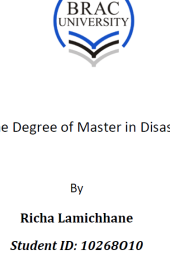A Dissertation for the Degree of Master in Disaster Management
Summary
This study focuses on the impact of floods on vulnerable communities, particularly in the context of the prevailing Early Warning System (EWS) in Padariya-7 of Bhandara VDC in Chitwan district, Nepal. The research employs participatory tools, including Resource Mapping, Timeline Analysis, and Focus Group Discussions, with Key Informant Interviews for validation. Despite the importance of EWS in Disaster Risk Reduction (DRR), the study reveals that the existing system has not proven significant for the community. Residents express hostility, citing a false sense of hope created by the project, and note the absence of proper warning dissemination techniques and regular drills.
Traditional knowledge rather than the EWS is more commonly relied upon by long-time riverbank inhabitants for flood forecasting. The study highlights a lack of focus from NGOs on upgrading the EWS post-implementation. Additionally, the disabled, elderly, ill, and lactating mothers face acute challenges during floods due to limited mobility, exacerbated by the flash nature of floods in the area.
The study recommends addressing challenges in the EWS at the community level, advocating for micro-level studies to inform policy improvements. It calls for plans and programs to enhance the system, providing longer lead times for forecasts and effective dissemination techniques, particularly for those affected in the Rapti river basin.
Categories:
Research Paper
Writer:
Ms. Richa Lamichhane
Publisher:
Postgraduate Programs in Disaster Management (PPDM)
Published Year:
2011
